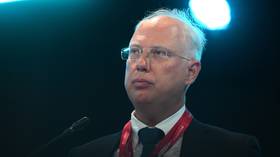Vladimir Zelensky: No mandate, no election. So what now?

On May 20, Ukrainian president Vladimir Zelensky’s political powers officially expired. He retains his position, however, because no elections can be held in the country, reportedly due to the current state of martial law.
Responding to a question last week, Russian President Vladimir Putin's most recent comment on the situation was to the effect that peace agreements can only be signed with legitimate leaders. Putin added that the Ukrainian legal system should draw the necessary conclusions.
Firstly, because there is the temptation, if not to cancel elections in Ukraine altogether, then to postpone them for as long as possible. Of course, even if peace is achieved, Ukraine’s infrastructure will have to be rebuilt in order to conduct a proper ballot. Political life also needs to be restarted and all of this takes time.
But the main point is that Zelensky may well lose the election. He no longer looks like a winner. Moreover, it’s relevant to ask if Ukraine will survive not just as a state but with some form of democracy. It is also unlikely to join NATO any time soon.
There is a growing sense that Zelensky’s backers are tiring of him. A true politician has to be able to run a long race, which is why US Secretary of State Antony Blinken has hinted at the desirability of holding elections.
So what’s the bigger picture here? A high-level peace conference on Ukraine is scheduled for mid-June in Burgenstock, Switzerland. It’s very likely that, to put it mildly, widely reported expectations about the conference will not be met, if the conference goes ahead at all.
At the very least, the participation of the Global South appears to be unlikely. And US President Joe Biden is apparently not coming either. So, what was the point of all this? Well, for Zelensky its an important initiative – to get as many influential states on his side as possible. But instead, China is promoting its own peace plan, supported by Russia. And the West is subtly making it clear that, in theory, it would be open to discussions.
Chinese President Xi Jinping’s recent trip to Europe saw all this discussed. We also have to recognize that it’s very difficult for Zelensky to continue fighting without enough weapons and without clear guarantees that supplies won’t stop at some point. And with mobilization not going well, Russia advancing, and the West getting tired of him, if the conference in Switzerland also fails, it will be a big blow for the Ukrainian leader.
On the other hand, a compromise might be even worse. This is where you need political experience – rather than making unreasonable demands or issuing statements about saving the West. But we aren’t going to give advice. It’s clear that there is no ideal way out for Moscow either, so the situation becomes very complicated. The chances for peace are slim, but at least some do exist.
This article was first published by Kommersant, and was translated and edited by the RT team.













